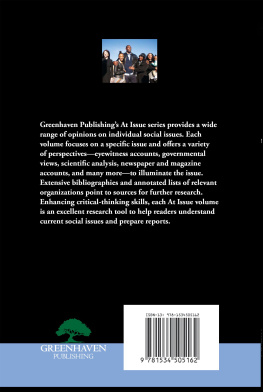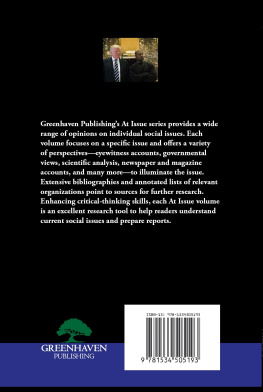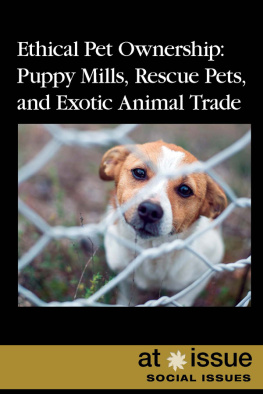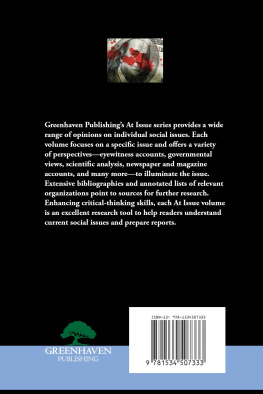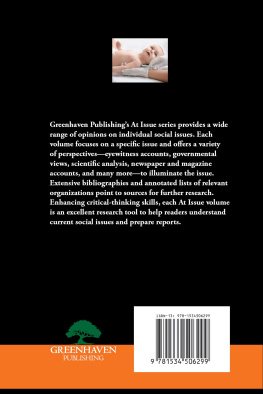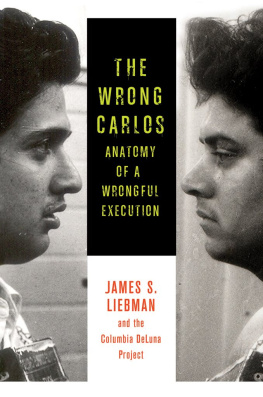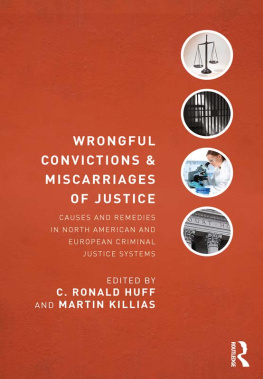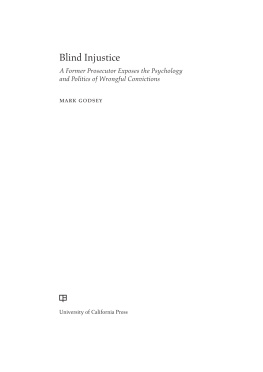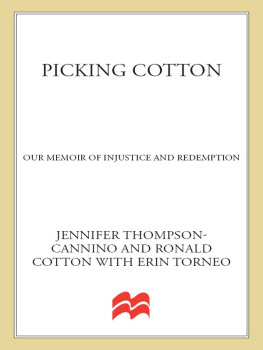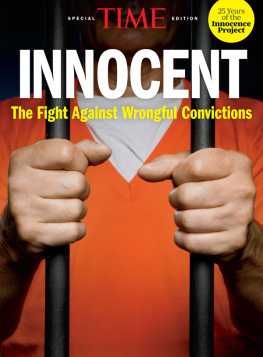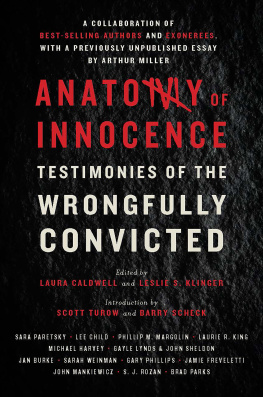
Wrongful Conviction and Exoneration
Other Books in the At Issue Series
Americas Infrastructure
Celebrities in Politics
Ethical Pet Ownership
Male Privilege
The Opioid Crisis
Political Corruption
Presentism
Public Outrage and Protest
The Role of Religion in Public Policy
Troll Factories
Vaping
Published in 2020 by Greenhaven Publishing, LLC
353 3rd Avenue, Suite 255, New York, NY 10010
Copyright 2020 by Greenhaven Publishing, LLC
First Edition
All rights reserved. No part of this book may be reproduced in any form without permission in writing from the publisher, except by a reviewer.
Articles in Greenhaven Publishing anthologies are often edited for length to meet page requirements. In addition, original titles of these works are changed to clearly present the main thesis and to explicitly indicate the authors opinion. Every effort is made to ensure that Greenhaven Publishing accurately reflects the original intent of the authors. Every effort has been made to trace the owners of the copyrighted material.
Cover image: Steve Maztker/Chicago Tribune/TNS via Getty Images
Library of Congress Cataloging-in-Publication Data
Names: Idzikowski, Lisa, editor.
Title: Wrongful conviction and exoneration / Lisa Idzikowski, book editor.
Description: New York: Greenhaven Publishing, 2020. | Series: At issue | Includes bibliographical references and index. | Audience: Grades 912.
Identifiers: LCCN 2019001966| ISBN 9781534505155 (library bound) | ISBN 9781534505162 (pbk.)
Subjects: LCSH: Judicial errorUnited StatesJuvenile literature.
Classification: LCC KF9756 .W758 2019 | DDC 345.73/0122dc23 LC record available at https://lccn.loc.gov/2019001966
Manufactured in the United States of America
Website: http://greenhavenpublishing.com
Contents
Centurion.org
The Cornell Center on the Death Penalty Worldwide
The Innocence Project
Elizabeth Webster
Lutz Roewer
Elaine Cassel
Margaret Weigel and John Wihbey
David Hamer and Gary Edmond
Samuel R. Gross, Barbara OBrien, Chen Hu, and Edward H. Kennedy
Seri Irazola, Erin Williamson, Julie Stricker, and Emily Niedzwiecki
Saskia de Melker
Alice Courtauld
Ian Millhiser
Scott Rodd
Liz Banks-Anderson
Introduction
B anks are robbed. People are mugged. Thieves grab electronics or jewelry. Drunk drivers slam into other vehicles. Innocent people are caught in the crossfire of drive-by shootings. Deranged terrorists plow through crowds. Crime seems to be everywhere we turn, especially when considering the way it is reported almost nonstop by news stations, social media, and TV broadcasts. Crime victims and people in general typically expect that perpetrators will be prosecuted and punished, but how frequently does this happen? Whats more, are all individuals tried and deemed guilty by the justice system truly guilty of the crimes for which they are convicted? And if not, are these individuals ever exonerated released from prison and absolved of responsibility for the crime that led to their conviction? What happens to them if they are?
Two important questions come to mind when considering conviction: Do innocent people get convicted, and how often do innocent people get wrongfully convicted? Experts say that no justice system is infallible, and that mistakes are made. In a piece for the Chicago Tribune, John Grisham stated that somewhere between two and ten percent of convicted individuals were wrongfully convicted. That may sound like a low percentage, but this translates to a large number of people in the United States: between 46,000 and 230,000. Grisham adds, Once an innocent person is convicted, it is next to impossible to get the individual out of prison.
Some countries have better track records when it comes to maintaining a fair and appropriate system of justice. Country-specific laws and international laws attempt to protect the innocent. But even with these safeguards, wrongful convictions occur for a variety of reasons. What could possibly account for an innocent person being mistakenly tried in court and determined guilty? According to the Innocence Project, several things may bring this about. Estimates on exonerated individuals show that roughly one in four gave false confessions, admitting they committed the crime despite being innocent. People who give false confessions are often confused, afraid, frustrated, and sometimes exhausted from being interrogatedthey want the questioning to stop. Interestingly, false confessions occur in particularly high rates in cases of murder.
Poorly completed forensics can also affect convictions, and according to the Innocence Project it is the second most common reason for wrongful convictions, as it is a factor in about 44 percent of them. Some forensic evidence is unreliable, such as bite mark identification. Otherssuch as shoeprint evidencehave not been studied enough to be considered valid. Poor forensic evidence can also be traced to human error or deliberate intentions to mislead or commit fraud in testimony. Changes in scientific principles, especially surrounding DNA evidence, have rapidly occurred, but not all community jurisdictions have kept up to date and may unintentionally use unreliable forensic techniques. Other reasons, such as police misconduct, jailhouse informants, and incompetent misrepresentation or bad lawyering, account for other wrongful convictions.
Studies show that the biggest factor leading to wrongful conviction is witness misidentification. Experts at the Innocence Project state that witness misidentification is a major contributing factor to unjust conviction. In the more than 350 wrongful conviction cases overturned by DNA evidence, approximately 70 percent of those wrongful convictions occurred because of witness misidentification.
Clearly, in the United Statesthe country with the highest incarceration rate in the world as shown by the Prison Policy Initiativemany individuals suffer because they have been wrongfully convicted and are serving prison terms unjustly. judged to be innocent, they often suffer again. When the now-innocent individuals are released from imprisonment, the victim often feels regret, guilt, and fear because they were involved in an an innocent person being sentenced in the first place. Often, fear is also a result because, they reason, the newly freed individual will want to seek revenge, come after them, and inflict bodily harm.
Ultimately, what becomes of the individuals that are exonerated? There appears to be a wide range of experiences for those who are deemed innocent and released from prison. States vary in terms of the laws that govern treatment of exonerated persons. Some provide appropriate support so that an individual can return to as normal of an existence as possible. But in other states the support may be little, if there is any at all. When initially taken into custody and tried, one has to pay legal fines and fees. The justice system is costly, and someone has to pay. But what happens if a guilty verdict is overturned? Does that mean the judged innocent will recoup their expenses? Not always. Sometimes the wrongly accused receives nothing in return, and sometimes they do get reimbursed, but only after a long and agonizing process.
Consider what happens after someone is imprisoned for any number of years and then is exonerated of his or her crime. How does he or she get by after being released? Once again, the situation varies greatly from case to case, and the experience differs between individuals. Some people have reported that they are given a compensation package including money for the time lost in prison. Others have received little or no back pay. According to the Innocence Project, on average it takes an exoneree about three years to receive any compensation after they are released. If they do receive a monetary benefit, roughly 81 percent have reported that it is less than $50,000 for each year they were wrongfully imprisoned, and about 25 percent have reported getting nothing at all. Not surprisingly, most of the exonerees say that they would give anything to get back the time they lost in prison.

